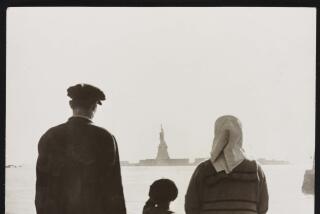James MacGregor Burns dies at 95; Pulitzer-winning historian
- Share via
James MacGregor Burns, a Pulitzer Prize-winning historian and political scientist who analyzed the nature of presidential leadership and wrote candid biographies of Franklin D. Roosevelt and John F. Kennedy, died Tuesday at his home in Williamstown, Mass. He was 95.
His death was confirmed by his companion and fellow historian, Susan Dunn.
The longtime Williams College professor helped coin two adjectives now common in politics: “transformational” leaders, or those with a vision to change the world, and “transactional” leaders, those with the cunning to get things done.
The words were used constantly during the 2008 presidential race, with the “transactional” Hillary Rodham Clinton battling the “transformational” Barack Obama for the Democratic nomination.
His two-volume biography of Roosevelt was praised by historians as a model of accessible, objective scholarship. The second volume, “Roosevelt: Soldier of Freedom,” was published in 1970 and won the Pulitzer and the National Book Award.
Burns’ other books included “Leadership,” a 1978 release that outlined his theories of “transformational” and “transactional” and became standard reading among students of business and politics; a biography of George Washington written with Dunn; and a trilogy on U.S. history, “The American Experiment.”
In his late 80s, he wrote a well-reviewed history of the Supreme Court, “Packing the Court,” and at age 95 he completed a book on the Enlightenment, “Fire and Light,” published last year.
Burns was born Aug. 3, 1918, in Melrose, Mass., the son of a conservative businessman. He majored in political science at Williams and received a Ph.D. in government from Harvard in 1947, the same year he began teaching at Williams.
He was an Army combat historian during World War II, recording the memories of soldiers just off the battlefield in Okinawa and elsewhere in the Pacific. He earned four combat medals and the Bronze Star.
Later, he worked on a task force headed by Herbert Hoover and served as a congressional aide in Washington. His first book, “Congress on Trial,” came out in 1949 and was praised by the New York Times as a timely assessment of how federal legislators were deadlocked by local concerns.
“Roosevelt: The Lion and the Fox” was published in 1956, at a time when little serious work existed on FDR, who died in 1945.
“I was very interested in how Machiavellian he was,” Burns told the Associated Press in 2007. “He was a manipulator, and at the same time he had to be a lion. To what extent did he use the tactics of a fox in order to advance the wishes of a lion? To what extent did he have to be a transactional leader to be able to become a transforming leader?”
Burns dismissed rumors, since confirmed, that FDR had an affair with his wife’s secretary, Lucy Mercer, but “The Lion and the Fox” is still regarded as a landmark for presenting the president without bias, as an idealist and deal maker. Roosevelt was the rare political leader Burns credited with being both transformational and transactional.
He had a more personal and complicated experience as the biographer of a living politician, Kennedy. Burns and Kennedy had gotten to know each other in 1958, when Kennedy was seeking reelection to the Senate and Burns was running for a seat in the U.S. House of Representatives. Burns lost his race, prompting him to note years later that he “related very well to Adlai Stevenson’s remark about being too old to cry and … hurting too much to laugh.”
When Burns agreed to write a biography of Kennedy, who was planning to run for president in 1960, the family promised full cooperation, hoping for a flattering portrait. But he labeled John F. Kennedy “casual as a cash register” and imagined that a Kennedy administration would be “quiet, taut, efficient — sometimes, perhaps, even dull.”
“The expectation was that it would practically be a campaign tract, which was never my intention, obviously,” Burns explained to the AP. “And when the book came out, they were exceedingly disappointed.”
Burns was married twice and had four children.
Marcelo and Italie write for the Associated Press.
More to Read
Start your day right
Sign up for Essential California for the L.A. Times biggest news, features and recommendations in your inbox six days a week.
You may occasionally receive promotional content from the Los Angeles Times.







